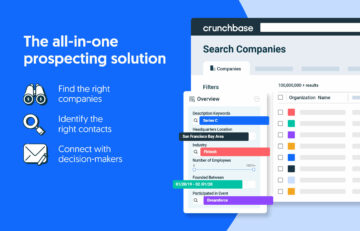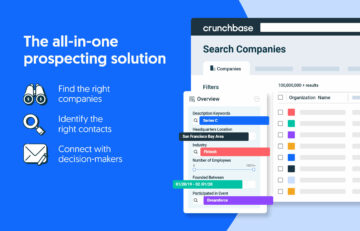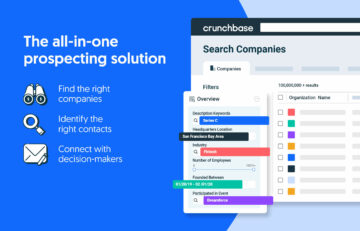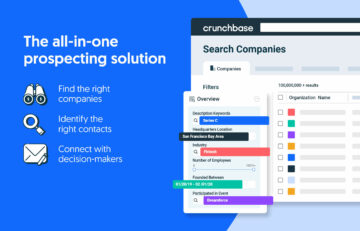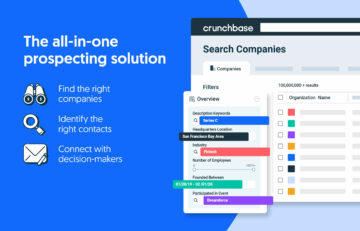By Dan Gray
As startup fundraising appears to be stabilizing after a few tumultuous years, there’s one topic which has reliably featured in that conversation: dry powder.
“Dry powder” refers to the amount of money that limited partners have committed to venture capital funds. Rather than being delivered upfront, that capital is requested in increments by VCs during the first few years of a fund in order to meet funding obligations to founders. That estimated number stood at around $580 billion at the end of 2022.
Search less. Close more.
Grow your revenue with all-in-one prospecting solutions powered by the leader in private-company data.
Depending on who you listen to, this mountain of capital is either a bullish signal — as VCs take advantage of the post-bubble environment to snatch up equity at bargain prices — or it’s meaningless, as poor fund performance, slower exits and higher interest rates incentivise LPs to direct their money elsewhere.
The truth, as always, is complicated.


Similar to VC term sheets (funding agreements with startups), we’ve learned that LP capital commitments aren’t as binding as the industry would have liked to believe two years ago. However, that theoretical pile-up of available capital is still a positive signal.
Not all of it will materialize, and VCs will have to be more disciplined with their deployment, but it is certainly better than starting with less, or zero.
Not everyone is affected equally
How this plays out will differ significantly between early- and growth-stage funding, emphasizing the distinct nature of the two disciplines, capital requirements and their recent behavior.
Generally speaking, pre-seed- and seed-focused firms aren’t suffering too much from the excesses of 2021 and 2022. Mainly, there’s greater recognition that they can no longer just pass hot deals up the chain for a bumped-up valuation, that era is over.
Growth-stage funds are in a real predicament. Remember that scene in “The Hangover” where the protagonists woke up in the hotel suite? Well, growth VCs are staring, bleary-eyed, at funky cap tables, down rounds and zombie companies. Lots of aspirin required.
In addition to the bifurcation of early- and growth-stage VC, we must also consider performance. Generally, the smaller, specialist firms are more likely to have maintained discipline, and the faith of their LPs, over the last few years, while the bigger generalists are more likely to have fallen victim to momentum.
What LPs are looking for
The model which emerged in venture capital over the last decade is dead. There is no appetite for the consensus-driven megadeals, nor the promise of exits that can support them. The asset class must return to its roots: identifying outlier opportunities in large markets. Finding winners, rather than trying to manufacture them with cheap capital.
If I was an LP in an early-stage firm I’d be comfortable seeing the pace of deployment on par with the past two years. I’d be looking for managers whose theses are rooted in that pursuit of outliers, who are guided by a degree of sectoral expertise rather than the ‘flavor of the month’ technology.
If I was an LP in a growth-stage firm I’d be hoping they were looking at ways to clear the minefield. Bridge rounds to reach profitability, zeroing out the zombies, doubling down to support the strongest performers, and continuing to look for good bets. Not sitting on the sidelines, waiting to see how things shake out.
The capital is out there for high-performing firms that have a compelling vision to share with prospective LPs (similar to the fundraising advice given to founders earlier this year). Transparency, discipline and standardization should be priorities if this industry wants to accelerate on this road to recovery, and a better model for the future.
Related reading
Dan Gray is an adviser supporting impact entrepreneurs in emerging markets, and is the head of marketing at Equidam, a platform for startup valuation.
Illustration: Li-Anne Dias


Stay up to date with recent funding rounds, acquisitions, and more with the Crunchbase Daily.
- SEO Powered Content & PR Distribution. Get Amplified Today.
- PlatoData.Network Vertical Generative Ai. Empower Yourself. Access Here.
- PlatoAiStream. Web3 Intelligence. Knowledge Amplified. Access Here.
- PlatoESG. Automotive / EVs, Carbon, CleanTech, Energy, Environment, Solar, Waste Management. Access Here.
- PlatoHealth. Biotech and Clinical Trials Intelligence. Access Here.
- ChartPrime. Elevate your Trading Game with ChartPrime. Access Here.
- BlockOffsets. Modernizing Environmental Offset Ownership. Access Here.
- Source: https://news.crunchbase.com/venture/limited-partners-dry-powder-startups-gray-equidam/
- :has
- :is
- :not
- :where
- $UP
- 2021
- 2022
- 300
- a
- accelerate
- acquisitions
- actually
- addition
- ADvantage
- advice
- After
- ago
- agreements
- All
- all-in-one
- also
- always
- amount
- an
- and
- appetite
- ARE
- AS
- asset
- asset class
- At
- available
- BE
- behavior
- being
- believe
- Bets
- Better
- between
- bigger
- binding
- BRIDGE
- Bullish
- but
- by
- CAN
- cap
- capital
- capital requirements
- certainly
- chain
- cheap
- class
- clear
- Close
- comfortable
- commitments
- committed
- Companies
- compelling
- complicated
- Consider
- continuing
- Conversation
- CrunchBase
- daily
- dan
- data
- Date
- dead
- Deals
- decade
- Degree
- delivered
- deployment
- differ
- direct
- disciplined
- disciplines
- distinct
- does
- doubling
- down
- dry
- during
- Earlier
- early stage
- either
- elsewhere
- emerged
- emerging
- emerging markets
- emphasizing
- end
- entrepreneurs
- Environment
- equity
- Era
- estimated
- Ether (ETH)
- everyone
- exits
- expertise
- faith
- Fallen
- featured
- few
- finding
- Firm
- firms
- First
- For
- For Startups
- founders
- from
- fund
- funding
- funding rounds
- Fundraising
- funds
- future
- generally
- given
- good
- gray
- greater
- Growth
- Have
- head
- high-performing
- higher
- hoping
- HOT
- hotel
- How
- However
- http
- HTTPS
- i
- identifying
- if
- Impact
- in
- industry
- interest
- Interest Rates
- IT
- ITS
- jpg
- just
- large
- Last
- leader
- learned
- less
- likely
- Limited
- longer
- Look
- looking
- LP
- LPs
- mainly
- Managers
- Marketing
- Markets
- materialize
- max-width
- mean
- Meet
- model
- money
- more
- Mountain
- much
- must
- Nature
- no
- nor
- number
- obligations
- of
- on
- ONE
- opportunities
- or
- order
- out
- over
- Pace
- partners
- pass
- past
- performance
- performers
- photo
- platform
- plato
- Plato Data Intelligence
- PlatoData
- plays
- poor
- positive
- powered
- Prices
- profitability
- promise
- prospective
- pursuit
- Rates
- rather
- reach
- real
- recent
- Recent Funding
- recognition
- recovery
- refers
- remember
- requested
- required
- Requirements
- return
- revenue
- road
- roots
- rounds
- scene
- sectoral
- see
- seeing
- Shake Out
- Share
- should
- Signal
- significantly
- similar
- Sitting
- smaller
- Solutions
- speaking
- specialist
- Starting
- startup
- Startups
- stay
- Still
- suffering
- suite
- support
- Supporting
- Take
- Technology
- term
- term sheets
- than
- that
- The
- The Future
- their
- Them
- theoretical
- There.
- they
- things
- this
- this year
- to
- too
- topic
- Transparency
- truth
- two
- Valuation
- VC
- VCs
- venture
- venture capital
- Victim
- vision
- Waiting
- wants
- was
- ways
- we
- WELL
- were
- What
- which
- while
- WHO
- whose
- will
- winners
- with
- would
- year
- years
- you
- Your
- zephyrnet
- zero
- zombie

